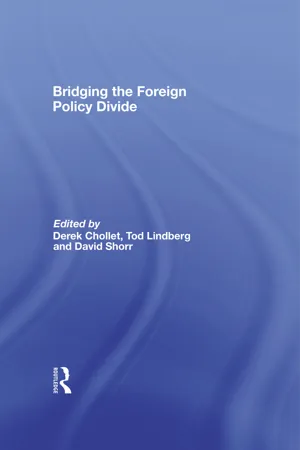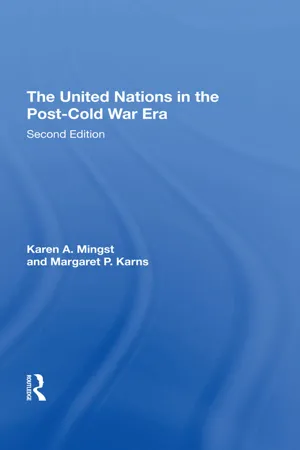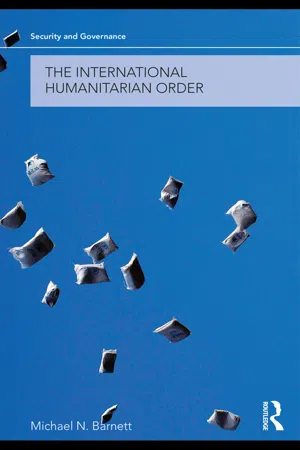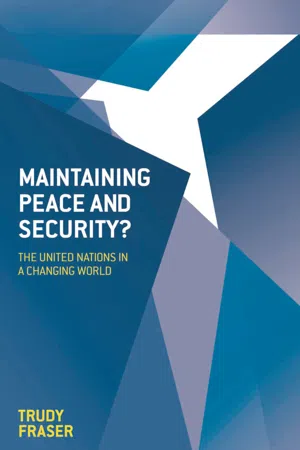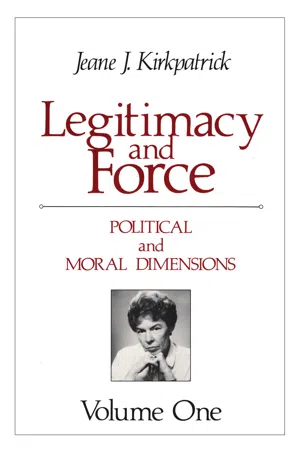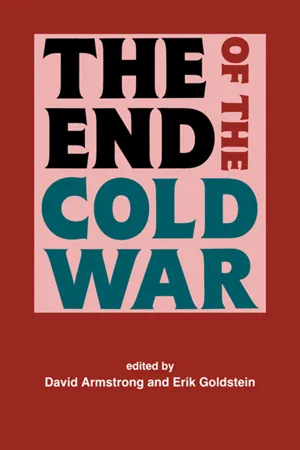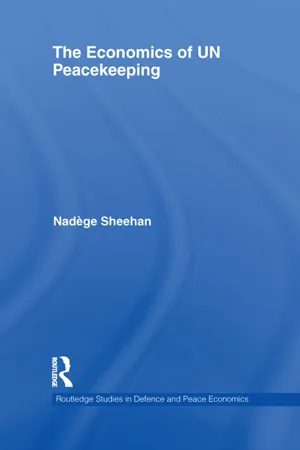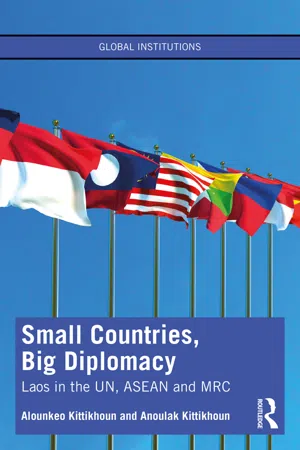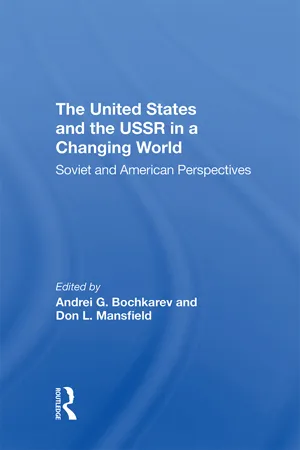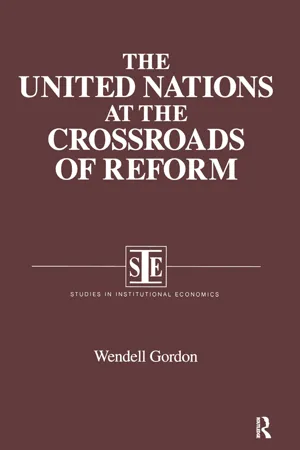Politics & International Relations
United Nations
The United Nations (UN) is an international organization established in 1945 to promote peace, security, and cooperation among nations. It provides a platform for dialogue and negotiation on global issues, including human rights, humanitarian aid, and sustainable development. The UN consists of multiple specialized agencies, programs, and bodies working towards the common goal of maintaining international peace and security.
Written by Perlego with AI-assistance
Related key terms
Related key terms
1 of 4
Related key terms
1 of 3
12 Key excerpts on "United Nations"
- eBook - ePub
- Derek Chollet, Tod Lindberg, David Shorr(Authors)
- 2009(Publication Date)
- Routledge(Publisher)
It is silly to deride the United Nations as "politicized," because it is inherently a political body. The United States should energetically engage the players in this legislature-like body. Successes depend on seeking support diligently and adroitly and forming different groups of partners on different issues. Yet marked success will involve working overtime to improve the mindset and conduct of politics at the United Nations. States' leaders face a basic choice regarding the United Nations' role and future: is the United Nations an instrument for cooperative problem solving or a debating society? Cooperation depends chiefly on political will, rather than changes in institutional arrangements unlikely themselves to alter international politics. For all of its difficulties, a great deal can be accomplished through the United Nations when governments close ranks behind it: pressuring Syria over the Hariri assassination,, caring for millions of refugees, providing a mandate for a coalition to drive Saddam Hussein out of Kuwait, improving airline safety and security, immunizing children and helping assure they receive education.The simple fact is that the world community needs vehicles for actions on which they can agree. But they have to muster the political will to agree. So in addition to being a vehicle for implementing solutions based on common interests, states should muster the political will to use the United Nations as its founders intended: as a forum to explore where their interests intersect. A frank expression of nations' interests to each other without facilitators speaking for them will help the United Nations play that role, if the temptation for polemics can be set aside.Progressives and conservatives can agree on a compromise course in multilateral policy involving two key dimensions. First, instead of focusing on structural changes, a more effective United Nations requires a change in the "culture" of the United Nations and its rigid blocs and caucuses. The politics of the United Nations could be more flexible. It would be helpful to ask questions like: Why do developing nations allow a few prominent bloc leaders to speak for them all despite their diversity of economic conditions, cultures, and interests? Why are some transregional blocs in the United Nations far more cohesive than the transregional democratic bloc? Why do regional blocs all too often shield their most repressive states from frank appraisal by the international community? Why is the Warsaw Pact still intact as a bloc in the United Nations? Why are Near Eastern, South Asian, and East Asian states all part of the same bloc? Here is where the Community of Democracies could play a role, not by replacing the United Nations, but by joining an expanded array of alternative caucuses within the United Nations. - Karen Mingst, Margaret P. Karns(Authors)
- 2019(Publication Date)
- Routledge(Publisher)
The Cold War’s end found the United Nations in greater demand than ever before to deal with peace and security issues as well as environmental and development issues, population growth, humanitarian disasters, and other problems. UN peacekeepers have been called on to play roles in rebuilding Cambodia; disarming combatant forces; organizing and monitoring elections in Nicaragua and Namibia; monitoring human rights violations in El Salvador; and overseeing humanitarian relief in Bosnia, Somalia, Rwanda, and many other post–Cold War problem areas. Beginning with Iraq’s invasion of Kuwait, the UN’s enforcement powers have been used more in the post–Cold War era than at any previous time.By 1995, however, the early post–Cold War optimism about the United Nations had diminished substantially. The peacekeepers in Somalia, Bosnia, and Rwanda found little peace to be kept, although their presence did alleviate much human suffering. Despite almost continuous meetings of the UN Security Council and numerous resolutions, the UN’s own members lacked the political will to provide the military, logistical, and financial resources needed to deal with these complex situations. In addition, the UN faced a deep financial crisis because of the increased cost of peacekeeping and other activities and the failure of many members, including the United States, to pay their assessed contributions. The UN celebrated its fiftieth anniversary in 1995 but failed to use the occasion to enact necessary reforms in its administration, financing, and structure.What is the role of the UN in world politics? In light of the substantial changes in the world since the UN’s founding in 1945 and the very different needs it faces today, how has the UN itself changed?The United Nations in World Politics: Vision and Reality
The establishment of the United Nations in the closing days of World War II was an affirmation of the desire of war-weary nations for an organization that could help them avoid future conflicts and promote international economic and social cooperation. The UN’s Charter built on lessons learned from the failed League of Nations created at the end of World War I and earlier experiments with international unions, conference diplomacy, and dispute settlement mechanisms. It represented an expression of hope for the possibilities of a new global security arrangement and for fostering the social and economic conditions necessary for peace to prevail.- eBook - ePub
- Michael Barnett(Author)
- 2009(Publication Date)
- Routledge(Publisher)
Three points are worth highlighting here. First, the demand for the United Nations to become more actively involved in human rights derives from pressures from international and domestic groups; not only are the United Nations and the international community interested in transmitting a greater respect for basic human rights, but many domestic groups that are the targets of human rights violations hope to use the United Nations and other international agencies to deter further violations. Second, the United Nations’ active and growing involvement in this area represents a radical departure from both its first-generation peacekeeping operations and its past stance toward human rights. Throughout the Cold War the United Nations was generally prohibited from venturing into this terrain; UN involvement in human rights was limited to development and decolonization, and any expression for the rights of minorities and ethnic groups was spurned as a violation of sovereignty and a distraction from the core issue of global political and economic inequality. Accordingly, the United Nations’ involvement in human rights both represents a radical change from its past stance and reflects a changing definition of security. Third, by encouraging recognition of human rights and democratic systems of rule, the United Nations is establishing a particular vision of how member states should organize their domestic relations. This highlights an important but little recognized feature of international institutions: they not only help to coordinate state interests but also shape the very identity and interests of the state.Part of the reason that the United Nations serves this function as a transmitter and articulator of constitutive norms is because it is endowed with tremendous legitimacy by the community of states. Thomas Franck and Inis Claude help us to understand why this is the case. Franck highlights that states seek to be viewed as legitimate by other states and to be understood as acting with a degree of moral authority and sanctioned purpose.28 States, Franck claims, not only represent the political communities contained within their borders, but are also embedded in a larger international community from which they derive their rights, obligations, and authority to act in legitimately sanctioned ways. “Nations, or those who govern them,” writes Franck, “recognize that the obligation to comply is owed by them to the community of states as the reciprocal of that community’s validation of their nation’s statehood.”29 Legitimacy, therefore, is conferred by others when the state convincingly demonstrates that it abides by the community’s norms. Claude nicely supplements Franck’s argument by pointing out that the United Nations is the only organization that approximates universality and has the authority to distribute seals of approval and disapproval. No other organization rivals the United Nations in these crucial respects.30 - eBook - ePub
Maintaining Peace and Security?
The United Nations in a Changing World
- Trudy Fraser(Author)
- 2014(Publication Date)
- Bloomsbury Academic(Publisher)
The founding principles of the organization adhered to the priority of inter-state peace and security, and rooted this arrangement within a strict standard of the inviolability of sovereignty. However, it also endorsed the importance of social and economic security as a necessary precondition to international peace and security.It is here that the fundamental tension of the UN finds its source. The organization is at the same time both profoundly politicized and hopefully idealistic. It is a realist organization concerned primarily with the concepts of power recognition, statehood and sovereignty, but it also embodies the normative aspirations of liberal institutionalists. At its founding, the UN was pulled in opposing directions by a commitment to the traditional structures of statehood and the ever-increasing economic and social interconnectedness of a global community.The UN’s operational structures are a direct legacy of the hegemonic leadership of the Big Four, who steered the creation of the UN to serve their interests. Whether the founding interests and abilities of the UN continue to serve the interests of international peace and security is a central question of this book.The UN today: the principle organs and their tasks
The Charter established six principle organs of the UN:• The General Assembly (Chapter IV of the Charter)• The Security Council (Chapter V)• The Secretariat (Chapter XV)• The Economic and Social Council (ECOSOC) (Chapter X)• The International Court of Justice (Chapter XIV)• The Trusteeship Council (Chapter VIII)While the Charter affords institutional equality to each of the six principle organs, the San Francisco Conference ensured that an essential reality of the organization is that the Security Council is imbued with the most importance because of its sole capacity to determine threats to international peace and security and as the only organ empowered with an enforcement mechanism. Three principle organs – the Security Council, the General Assembly and ECOSOC – produce resolutions or decisions of the Member States. The extent to which these resolutions are binding differs, based on the Chartered mechanisms that the organization can use to enforce its resolutions. In practice, General Assembly resolutions and ECOSOC resolutions are considered to be voluntary, or non-binding, while Security Council resolutions are binding or not, depending on the context in which the resolution was produced (see De Wet 2004: 39–40). - eBook - ePub
Legitimacy and Force: State Papers and Current Perspectives
Volume 1: Political and Moral Dimensions
- Jeane J. Kirkpatrick(Author)
- 2018(Publication Date)
- Routledge(Publisher)
Annual reviews of UN voting patterns and practices provide this Committee, as well as the electorate in general, with a reliable, systematic basis for assessing the attitudes, the policies and the decisions of UN members on the salient questions of our time that come before the UN General Assembly and Security Council for consideration and action. Here we have the hard evidence of what has happened on issues of importance to us. From it, we can make judgments concerning those whose values and views are harmonious with our own, and whose policies are opposed to ours, and those who fall in between. Beyond views, of course, come interests—often vital interests. So it is important that we take due note of actions which comport with, or are opposed to, what we regard as vital interests.The UN is a complex arena whose dynamics differ significantly from relations in other arenas. Distinctive patterns of international politics have developed in UN arenas which often seem to have little relation to our bilateral relations. Often, far too often, only casual, intermittent and inadequate efforts have been made to integrate U.S. policies and relations with other nations inside the UN to U.S. policies and relations with those same nations outside the UN Yet, UN interactions and decisions have important affects on our ability to achieve our goals outside the United Nations. Often, relations in the UN fora shape the context and limit the options available to the U.S. in the world.In examining the voting record of member states in the UN it should be borne in mind that relations in the United Nations are only one dimension of our relations with other countries and often are not the most important aspect of these relations. Economic, strategic, moral factors may be and often are more important to U.S. interests, policy and policy-makers than a country’s behavior inside the United Nations. However, at the same time, if a given country’s relations inside the UN are not all important, or even the most important factor in our relations with it, neither can relations inside the United Nations be considered trivial.If the decisions and policies of the key bodies of the United Nations matter, then the votes of member nations matter. If UN decisions make little or no difference to our interests, then the United States should surely devote less money and energy to our UN participation. - eBook - ePub
- David Armstrong, Erik Goldstein(Authors)
- 2013(Publication Date)
- Routledge(Publisher)
The United NationsALAN JAMESThe United Nations is a body which can easily evoke strong emotions. Among publics, this is perhaps most clearly seen in the hopes which are periodically aroused that the UN is about to usher in a better world. After all, the UN Charter starts off with the ringing declaration that the organization is intended ‘to save succeeding generations from the scourge of war’.1 It is not surprising that some take this at face value, and imagine the UN to have the ability to achieve this end independently of the sovereign states who are the components of both the world’s political structure and the UN. All that is needed, it often seems to be implied, is a requisite amount of effort and determination on the part of ‘the UN’, and ‘peace’ will be not just around the corner but present in the here and now.Not unnaturally, the failure of this a-political vision tends to produce disenchantment. And sometimes, maybe but not necessarily for reasons connected with this, publics swing in the opposite direction. Now the UN is seen as an organization full of mischief and even malice, and therefore one which should be viewed with grave suspicion. Instead of a body whose face is automatically turned towards the light, it is characterized, almost, as the abode of darkness. The United States public, with what some might see as typical volatility, provides illustrations of both these phenomena, the first of them echoing the enthusiasm for the League of Nations which was to be found in Britain between the two world wars.It might be thought that governments would be immune from such attitudes, because of their presumed political literacy. This, it could be supposed, would lead them to take a cool view of the UN, seeing it as an arena available for manipulation rather than as a notional person marching determinedly (indeed, pre-determinedly) in this direction or that. But not so, or at least apparently not so. For, perhaps on account of the UN’s wide-ranging agenda and the distance at which it usually stands from the immediate concerns of its member states, the organization can easily trigger official responses of a distinctly emotional sort. And the lather into which states sometimes get about the UN can be of both the hot and cold varieties. On the one hand, but only when there is a close identification between national positions and those taken by the UN, the organization is sometimes represented as in natural occupation of the moral high ground. On the other, and often when a state is in the minority at New York, the UN may be officially pictured as malignly biased against that state. In the UN’s early years the United States tended to adopt the first approach, and in the 1980s the latter. Under de Gaulle in the 1960s, France had little but contempt for the organization. - eBook - ePub
- Nadège Sheehan(Author)
- 2011(Publication Date)
- Routledge(Publisher)
As Klein (2002–4) writes, ‘there is an old maxim in peacekeeping. Before you ask a wise man, ask someone who has done it’, and the administrative experience of the UN in fielding peacekeeping operations is unparalleled. The multiethnic and multinational nature of UN peacekeeping is itself an asset. The UN assumes a broadened agenda for maintaining international peace and security. This includes, notably, rebuilding a country’s infrastructure after a long civil war, rebuilding the judiciary system of war-torn states, monitoring human rights and investigating human rights violations, safeguarding the delivery of humanitarian assistance to vulnerable human populations, providing support for the restructuring of police forces as well as the army (Gama 2008), and rebuilding or creating the necessary legal, political and economic institutions for proper economic and social development. Gama (2008) notes that not even the massive setbacks in the former Yugoslavia, Somalia and Rwanda discouraged the UN in taking up these responsibilities. Diehl (2003) indicates that, as often as not, governments call the UN. The UN is much more than the Security Council and the General Assembly, especially in post-conflict settings. It is also a loosely structured, increasingly well-coordinated system of operating agencies that protect refugees, distribute emergency food, immunize children, promote human rights and organize peacekeepers, as well as political and electoral advisers for states in distress or in transition from war to peace. Clean water, child health, landmine removal, food and agricultural aid, refugee repatriation, human rights investigations, electoral advice and election conduct are all products of UN work. However, as nations put their troops primarily in operations conducted by the EU or NATO, or as the United States turns mostly to ‘coalitions of the willing’ arrangements that are the military equivalent of pickup basketball, the UN’s effectiveness is undermined. This is especially true in the more difficult post-conflict settings because the developing countries that now provide UN peacekeepers by and large lack the transport and support forces as well as the communication and intelligence necessary to deal with a situation where one of the parties chooses to undermine the mission. - eBook - ePub
Small Countries, Big Diplomacy
Laos in the UN, ASEAN and MRC
- Alounkeo Kittikhoun, Anoulak Kittikhoun(Authors)
- 2021(Publication Date)
- Routledge(Publisher)
Many academics and practitioners even conjecture that there are practically three UNs – the First UN of member states, the Second UN of the Secretariat and various UN agencies, programs and organizations, as famously distinguished by the scholar Inis Claude, 4 and the Third UN of those NGOs, academics and actors who sit outside the formal UN but closely work and engage with it on a regular basis, as recently penned by the eminent UN expert Thomas Weiss and his colleagues. 5 When the UN succeeds, it is probably good to talk about UN collective success; but when it fails, it is probably wise to point to which parts or all three for that matter. 6 The First UN operates through three main permanent bodies – the General Assembly, the Security Council, and the Economic and Social Council, all located in the UN’s New York Headquarters. The International Court of Justice, whose statute is an integral part of the UN Charter, is also a UN body located in The Hague, with a mandate to adjudicate disputes between states upon their requests. And most recently, the Human Rights Council, located in Geneva, came into being in March 2006, replacing the UN Commission on Human Rights, with a mandate to protect all human rights around the globe, meaning in all member states of the UN with no exception. The UNGA is the most universal body of the world organization, with all member states large and small represented, each having one voice one vote, with resolutions passing by simple or two-third majority. 7 The universality of the UNGA and the one-nation-one-vote principle are especially important for small states. The UNGA works on various issues through six standing Committees – the first committee on political and disarmament, the second on economic, the third on social, the fourth on special political and decolonization, the fifth on budget and the sixth on legal - eBook - ePub
The United States And The Ussr In A Changing World
Soviet And American Perspectives
- Andrei Bochkarev, Don L Mansfield(Authors)
- 2019(Publication Date)
- Routledge(Publisher)
Part Four The Role of the United NationsAfter forty years of minimal political and financial support for the United Nations, in mid-1987 Moscow signaled a change in policy. In line with Mikhail Gorbachev's "new thinking" on Soviet international relations, Soviet policymakers began to use the United Nations to further political and arms control objectives. Prior to this change the international organization was considered to have limited utility except for isolating the United States or soliciting favor with Third World countries.The "new" Soviet diplomacy at the United Nations represented such a radical change from the previous four decades of confrontation that the United States was not sure how to react. Ironically, during much of the period that Moscow was "discovering" the U.N., the United States seemed to be abandoning it. As a result, Washington was highly skeptical that the international organization could play the role in superpower and global relations that the Soviets were now suggesting. American priorities at the U.N. in the 1980s were limited, and there was considerable skepticism regarding the benefits of multilateral coordination. However, both the substance and tone of American policy began to change with the Bush administration, and the United Nations (as well as other international organizations) was received more favorably than had been the case just a few years prior. Indeed, superpower perspectives on the value of the U.N. evolved to the point that they were surprisingly similar. As a consequence of this change in policy and behavior by both superpowers, the United Nations has been revived. Both the Soviets and Americans are more comfortable dealing with each other at the United Nations than at any time in recent memory. At the 44th General Assembly, an unprecedented joint resolution was submitted by the USSR andUnited States calling for a reinvigorated U.N. The new spirit has been shown in unprecedented superpower cooperation during the recent Gulf war. Soviet support of the Americansponsored U.N. resolution to liberate Kuwait after the Iraqi invasion would have been inconceivable just a few short years ago. - eBook - ePub
The Bush Doctrine and the War on Terrorism
Global Responses, Global Consequences
- Mary Buckley, Robert Singh(Authors)
- 2006(Publication Date)
- Routledge(Publisher)
Overall, then, the aftermath of the Iraq debate left the UN weakened with a deeply divided Security Council and a lingering US hostility not just to France, but also to ‘old Europe’ in general. Britain’s reputation as an internationalist and pro-UN state was severely compromised; a precedent was set for preventive war in violation of the Charter; and leaders such as Sharon and Putin were handed ready-made justifications for their policies towards Palestine and Chechnia respectively. Arab states could not help but note the hypocrisy of the US in calling for strict implementation of UN resolutions on Iraq while turning a blind eye to Israeli violations of other UN resolutions. Just 18 months after the US worked effectively with the UN to create an international coalition to bring down the Taleban regime and establish a strong international response to the threat posed by al-Qaeda, Zbigniew Brzezinski (2004: 214) noted that the ‘global solidarity with America has increasingly been transmuted into American solitude’.Bush and the UN: areas of cooperation
Anyone looking for confirmation of a terminal crisis between the UN and Washington will be disappointed by the evidence that the US continues to give support to the organization in a wide number of areas and through a wide range of activities. Shashi Tharoor (2003: 75) points out that, ‘even while disagreeing on Iraq, the members of the Security Council unanimously agreed on a host of other vital issues, from Congo to Côte d’Ivoire, from Cyprus to Afghanistan. Indeed, the Security Council remains on the whole a remarkably harmonious body.’ Albright (2003b: 17) seems to agree, claiming that ‘beyond the Council itself, the United Nations’ ongoing relevance is evident in the work of the more than two dozen organizations comprising the UN system’.It is true that there have been tensions in other areas. Two in particular stand out. The first is the ongoing US opposition to the International Criminal Court. This is not a UN body but, in 2002, the US threatened the UN’s peace-keeping role because of a fear that American personnel serving on such missions could be prosecuted for war crimes. In June that year, it even vetoed a resolution to extend the UN peace-keeping operation in Bosnia. Eventually, a compromise was worked out in Security Council Resolution 1422 of 12 July 2002. This exempted officials or personnel from a contributing state not a party to the Statute from investigations or prosecutions for acts or omissions committed on UN-authorized operations unless this was authorized by the Security Council, where the US, of course, holds a veto. This exemption was to last for a year, but it was extended for another 12 months in June 2003 by Security Council Resolution 1487, against the wishes of the Secretary-General. France, Germany and Syria abstained in this vote, but Paris did not use its veto. However, in June 2004, against the background of the Abu Ghraib prison scandal, the US abandoned its attempts to get the exemption extended for another year when it became clear that it would not obtain nine votes in favour in the Council. In retaliation, the US withdrew two small US contingents from the peace-keeping missions in Eritrea/Ethiopia and Kosovo – a total of just nine people. - eBook - ePub
- Stefan Wolff, Christalla Yakinthou, Stefan Wolff, Christalla Yakinthou(Authors)
- 2013(Publication Date)
- Routledge(Publisher)
The United Nations and Global Conflict Management Anoulak Kittikhoun and Thomas G. WeissDOI: 10.4324/9780203803004-6The United Nations plays a distinctive role in conflict management in divided societies, which we critically examine in three ways. The first offers an overview in theory of relevant UN bodies and mechanisms; particular attention is devoted to the roles and powers of the Security Council, the General Assembly, and the Secretary-General and Secretariat. The second surveys these UN entities in the historical practice of conflict resolution from the Cold War to the post-Cold War and contemporary periods; it highlights the nature of the international system and problems in each period, and accordingly the evolution in UN thinking and practice. We end by arguing that the UN has been blessed with a number of strengths as a conflict management instrument but simultaneously plagued by some key structural flaws.UN Conflict Management in Theory
As part of its overall responsibility for maintaining international peace and security – the fundamental reason behind the world organization’s establishment – the UN’s work in conflict management draws on two broad mechanisms conferred upon it in Article 1.1 of the UN Charter: peaceful settlement of disputes and collective security enforcement. In this section, we use the term ‘conflict management’ broadly to encompass prevention, management and resolution. For the UN in practice, they are linked and often pursued simultaneously.Peaceful Settlement of Disputes
The UN is not required to manage or resolve any conflicts – the Security Council may address them if they constitute threats to international peace and security. Indeed, Chapter VI of the Charter urges the conflicting parties to ‘first of all, seek a solution by negotiation, enquiry, mediation, conciliation, arbitration, judicial settlement, resort to regional agencies or arrangements, or other peaceful means of their own choice’ (Article 33.1) (see Mani 2007 - eBook - ePub
- Wendell Gordon(Author)
- 2016(Publication Date)
- Routledge(Publisher)
Part IThe Organization and Functioning of the United Nations1 The United Nations and Its Membership
The charter of the United Nations states: “We the peoples of the United Nations determined to save succeeding generations from the scourge of war, which twice in our lifetime has brought untold sorrow to mankind, and … to establish conditions under which justice and respect for the obligations arising from treaties … can be maintained … have resolved to combine our efforts to accomplish these aims.” The charter also refers to “fundamental human rights,” equal rights for all “nations large and small,” the promotion of “social progress and better standards of life in larger freedom,” and the employment of “international machinery” to accomplish such goals.The United Nations became operative as the successor organization to the League of Nations on October 24, 1945, on the basis of the charter signed at San Francisco on June 26 of that year.1 In May 1946 the League of Nations formally dissolved itself and transferred its assets, property, and buildings to the new United Nations.Against the background of the League’s inability to handle the mess of the 1930s, the leaders of the Allies, particularly Franklin Roosevelt and Winston Churchill, had begun early during World War II to plan for a more effective worldwide organization to keep the postwar peace. To this effect there were an Inter-Allied Declaration signed June 12, 1941, at St. James’s Palace in London; an Atlantic Charter, agreed to by Roosevelt and Churchill on a battleship in the North Atlantic on August 14, 1941; a “Declaration by United Nations” on New Year’s Day, 1942; declarations at conferences in Moscow, October 3, 1943, and Tehran, December 1, 1943. Concrete plans were first drawn up at a mansion in Washington called Dumbarton Oaks in the fall of 1944. There followed the notorious conference at Yalta involving Roosevelt, Churchill, and Joseph Stalin, in February 1945. The charter of the United Nations was then formally adopted at the conference in San Francisco. Enough ratifications were received to justify the United Nations’ formal existence beginning October 24, 1945. The organization began to function with the opening of the first General Assembly on January 10, 1946, in London. On February 14 the General Assembly voted to accept the United States’ invitation to locate the permanent headquarters there. Temporary headquarters were first located at Hunter College in New York City, (the Bronx) and then at Lake Success on Long Island. The decision to locate permanently on Manhattan’s East Side was made December 14, 1946. Occupancy of the headquarters building began in August of 1950.
Index pages curate the most relevant extracts from our library of academic textbooks. They’ve been created using an in-house natural language model (NLM), each adding context and meaning to key research topics.
Explore more topic indexes
Explore more topic indexes
1 of 6
Explore more topic indexes
1 of 4
